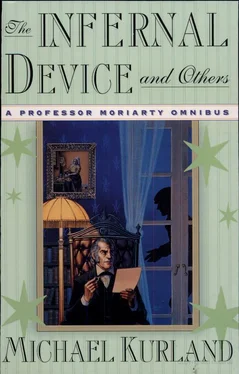"What did happen?" Barnett asked.
"After the train started up again, my agents opened the treasure chests, removed all the baubles, and closed and very carefully re-sealed the chests. Then, immediately after the train passed through Hampermire Station, they spread newspaper on the floor, and carefully immersed each article in a basin containing an oily solution, with just a hint of creosote, which dyed the item a dingy brown. Then they tossed it through the hole. The jewelry was spread over six miles of track, and quite invisible unless you were looking for it. Even then it would be easy to miss."
"You were at Hampermire," Barnett said.
"True. And Toby was waiting for me."
"Toby?"
"A hound I borrowed from a friend. Quite a nose, Toby has. I believe he could follow the scent of creosote through a windstorm in a peppermill."
"Ah!" Barnett said.
"The rest is obvious," Moriarty said. "The two in the wagon cleaned up, leaving no trace of themselves, and tossed the detritus onto the track, where other agents immediately removed it. Then they themselves went into a carefully prepared hole when the train was forced to stop for a herd of cows which had unaccountably broken through their fence and wandered onto the track. They pulled a specially prepared metal patch over the hole in the floor and, by igniting a thin strip of magnesium which came out the bottom, caused it to solder itself into place."
Barnett thought this over for a while. "Very neat," he said. "They'll never catch on to it. It will be one of the mysteries of the century."
"I doubt that," Moriarty said. "The authorities will, sooner or later, discover how it was done. Especially if, as I suspect, they call in Sherlock Holmes. But by the time they figure it out, the back-trail will be so cold that all their leads will peter out into dead ends. Your little bit of misdirection, I believe, will elude even Mr. Holmes."
"I sincerely hope so," Barnett said. "I have developed a distinct aversion to prison food." He got up and, taking his shoes in his hand, hobbled out of the study and started up the stairs.
TWENTY-TWO — TETE-A-TETE
"He knows that I know, and I'm sure he knows that I know he knows. But for all of that, can I assume that he knows I know he knows I know he knows?"
"I don't follow that," the baroness replied. "And I wish you'd stop; you're giving me quite a headache!"
— d'Arcy St. Michel
At ten o'clock the next morning, Sherlock Holmes was at the front door of 64 Russell Square, yanking on the bellpull. "Tell your master I wish to see him," he announced when the butler opened the door.
"Yes, sir," Mr. Maws replied, bowing and stepping aside in a parody of butlerian stiffness. "Alone today, are you, sir? Please follow me into the study. The professor is expecting you. I shall inform him that you're here, and he will be down directly."
"Expecting me, is he?" Holmes asked, stalking into the study and glaring around at the furnishings.
"Yes, sir," Mr. Maws said. "So he told me, sir."
Ten minutes later, when Moriarty came downstairs and entered the study, he found Holmes crouching in front of the desk, unabashedly going through the third drawer down. "Looking for something?" Moriarty demanded, reaching around his desk and slamming the drawer.
Holmes jerked his hand aside. "Always, Professor," he said. "And someday I'll find it." He retreated to the black leather armchair on the other side of the desk. "I have this insatiable curiosity about you, Professor Moriarty. Every little thing you do is of interest to me. Every little scrap of paper in this room helps, in some small way, round out my picture of you and your activities."
"Would you care to go through the bottom drawer?" Moriarty asked. "I assume you've already been through the upper two."
"Very kind of you," Holmes said. "Some other time, perhaps."
Moriarty settled into the chair behind his desk and regarded Holmes unblinkingly. "You have lost all shame, Holmes," he said. "It was but a few weeks ago that you and a squad of cloddish policemen went through this house from attic to sub-basement, examining the contents of every drawer, scratching furniture, bending lampshades, ripping curtains, breaking porcelain, and no doubt stealing the silver. After that farce it will be a long time before you get any judge to issue you another warrant against any of my property. And yet here you are again, going through my desk."
"Your butler had me wait in here," Holmes said mildly. "I was merely amusing myself while I waited."
"I admit I should have locked the drawers and cabinets before you arrived," Moriarty said. "But I keep forgetting, Holmes, that you are capable of such appalling manners."
Holmes chuckled. "Perhaps you are right," he admitted. "But only in my dealings with you, Moriarty. I assure you that when it comes to the rest of humanity, I am considered urbane and civil, and my manners are irreproachable. There is something about our relationship that brings out my worst qualities. I think it is, perhaps, the fact that every time I see you sitting there in your sack coat and your striped trousers and your impeccably knotted cravat, with a painting worth ten thousand pounds hanging on your wall and library filled with rare books and a winecellar filled with rare vintages, I cannot help reflecting that were there any justice in this world, you would be wearing gray cloth and occupying your time by walking the treadmill at Dartmoor."
"Justice, Holmes? Were there any justice, you would be forced by the state, whose rules you admire so greatly, to spend your time in some profession more fitting to your talents, such as giving diverting lectures in music halls, and identifying the occupations of ten random ticket holders. Instead you spend your days following me about and annoying me at every opportunity."
"Your butler said you expected me," Holmes said.
"And so I did," Moriarty replied.
"Why? I had no appointment with you."
"There was a major crime yesterday, was there not?" Moriarty inquired. "An 'impossible' crime, one of the newspapers called it. Surely it was not a wide leap of logic to assume that you would be called in. And even more surely, you would immediately scurry around to see me. Hoping, no doubt, to find a great pile of stolen artifacts on the rug."
"Indeed," Holmes agreed complacently. "Almost startled not to. You don't object, I suppose, if I look under the rug?"
Moriarty sighed. "Understand, Holmes, that I am somewhat honored that you suspect me of committing every crime in London that you can't solve. However, it does get to be wearing after a time."
"Not the crimes I can't solve, Professor," Holmes said, smiling tightly. "In several instances I have solved them to my satisfaction, I have just been unable to provide enough proof to bring the case before a jury. That is where you have shown yourself so infernally clever, my dear Professor Moriarty. I know you for the rogue you are, but I can't prove it. However, you and I know that I shall not stop trying; and one of these times, I shall succeed. And then you will exchange your black sack coat for prison gray. But enough of this cheery conversation; I wish to speak to you of trains and treasures."
"Curiously enough, Holmes, I also wish to speak to you, although on another subject. Shall we discuss the fate of the Lord East Collection first, and then get on to more consequential matters?"
There was a knock at the door. "That would be Mr. Barnett," Moriarty said. "I have asked him to sit in on our little t ê te- à -t ê te, if you don't mind?" Then, without waiting for Holmes's response, he called for Barnett to come in.
"Good morning, Professor," Barnett said, coming through the door with a cup of coffee in his hand. He looked tested. "Good morning, Mr. Holmes." He sat down on the leather couch and sipped his coffee.
Читать дальше












